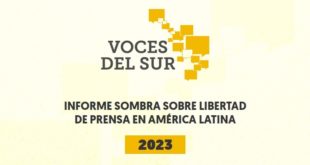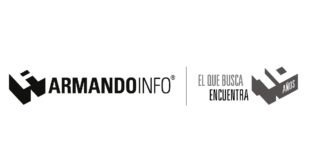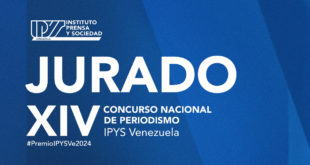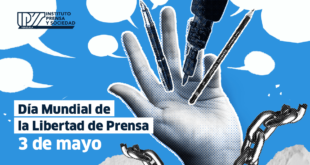El 21 de febrero de 2013, funcionarios de la Milicia Nacional Bolivariana, cuerpo militar conformado por ciudadanos adscrito del Ministerio para la Defensa intentaron detener de manera arbitraria a Cristian Hernández, reportero gráfico de 2001, diario privado de circulación local. También, le ordenaron que borrara las fotografías que había realizado a las afueras del Gran Abasto Bicentenario, promovido por el gobierno nacional, en San Bernardino, en el centro de Caracas, Distrito Capital.
Hernández contó a IPYS Venezuela que él se encontraba a las afueras del supermercado, haciendo algunos registros fotográficos para una pauta del periódico sobre el abastecimiento de alimentos en distintos mercados de Caracas.
Al parecer, un señor que salía del supermercado se molestó y le dijo que él no podía estar ahí haciendo fotos y que iba a informar a las autoridades del local sobre esta irregularidad. Luego, un funcionario de la Milicia Nacional Bolivariana salió del abasto y le dijo no tenía permiso para estar haciendo las fotos y le ordenó que borrara las imágenes que había capturado. El funcionario le dijo a Hernández que lo acompañara para que conversaran. En ese momento, se acercó otro efectivo que se identificó como sargento, y de manera violenta le decía que lo iban a detener. Minutos después, llegó Eliscartt Ramos, la reportera que lo acompañaba en la pauta y que había entrado al supermercado a realizar un recorrido para ver cómo se encontraba abastecido.
Al equipo reporteril lo llevaron a una oficina de seguridad del mercado. El gerente del local les dijo que como estaban haciendo el trabajo de prensa sin permiso los podían denunciar. El funcionario militar les dijo que la prensa lo que buscaba era “desestabilizar”, que el supermercado estaba bien abastecido por el gobierno, y ellos trabajaban para ofrecer seguridad al pueblo. Además, señaló que los equipos reporteriles tenían que solicitar un permiso para poder hacer esa labor.
A Hernández le solicitaron su cédula, y le quitaron un carnet de reportero gráfico. Asimismo, los efectivos redactaron un acta por la presunta infracción y lo obligaron a firmarla. Luego, los funcionarios le ordenaron que borrara las imágenes que había capturado al frente del mercado, las cuales eran referenciales y solo mostraban a personas caminando con las bolsas de sus compras. En ese momento, el supuesto sargento, de manera violenta intentó quitar la cámara fotográfica.
Hernández había guardado en un bolso la tarjeta de memoria de la cámara, y les explicó a los funcionarios que ésta la tenía guardada, y que se la había a colocar a la cámara para mostrarles las fotos y ellos vieran que no estaban haciendo nada ilegal. Los funcionarios se molestaron y le decían dijeron qué por qué estaba guardando las evidencias, que eso era un delito. También, alegaban que los iban a llevar detenidos porque no estaban cooperando con el procedimiento. Al rato, los funcionarios dejaron ir al equipo reporteril.
La actuación de los efectivos de la Milicia Nacional Bolivariana muestra un uso abusivo del poder estatal que obstaculiza la labor informativa de la prensa, y busca intimidar la labor de los equipos reporteriles.
Etiqueta: uso abusivo del poder estatal, amenaza de acción legal, intimidación
_________________________________________________________________
Lea la versión en inglés
Bolivarian militia ordered a graphic reporter to erase all his photographic records
On February 21, 2013, National Bolivarian militia officials, a military corps made up by citizens and ascribed to the defense ministry attempted to arbitrarily detain Cristian Hernández, a graphic reporter of a private local newspaper entitled 2001. They also ordered him to erase all the photos he had taken outside the large Bicentennial food store (in Spanish,Gran Abasto Bicentenario), sponsored by the national government and located in San Bernardino, downtown Caracas, federal district.
Hernández told IPYS Venezuela that he was outside the supermarket, making photographic records -as requested by the newspaper he works for- on food supplies in various markets in Caracas.
Apparently, a man leaving the supermarket got annoyed and told him that he could not be there taking photos and that he was going to inform the store authorities on this irregular situation. Later, a National Bolivarian militia officer came out of the store and told him that he did not have permission to be taking the shots and ordered him to erase the images he had captured. The officer told Hernández to accompany him so that they could talk. Then, another officer approached them and identified himself as a sergeant, and in a violent manner told him that he was going to be arrested. Minutes later Eliscartt Ramos, the reporter that was accompanying him in this job stint and who had entered the supermarket to walk around and see how many food supplies it had, appeared.
The reporter crew was led to a security office in the supermarket. The store manager told them that, since they were doing press work without a permit, they could be charged. The military officer told them that what the press was seeking was to “destabilize”, that the supermarket was well stocked by the government, and that they were working to offer food security to the people. He also pointed out that reporter crews had to request a permit to do that task.
Hernández was asked to show his identity card, and they took away his card identifying him as a graphic reporter. The officers also drafted a suit for the alleged infraction and forced him to sign it. The officers later ordered him to erase the images he had captured of the store front, which were for reference purposes and only showed people walking out with their shopping bags. Then the so-called sergeant violently attempted to snatch his camera from him.
Hernández had saved the camera´s memory card in a bag, and explained to the officers that he had kept it there, and that it had to be inserted into the camera to show them the pictures so they could see that they did nothing illegal. The officers got annoyed and asked him why he was withholding evidence, stating that that was a crime. They also threatened to arrest them because they were not cooperating with the procedure. After a while, the officers let the reporter crew go.
The way the National Bolivarian militia officers acted is evidence of an abusive use of the state´s power that hinders the press´ task of informing, and seeking to intimidate reporter crews while doing their job.
Label: abusive use of the state´s power, threat of legal action, intimidation
 IPYS Instituto Prensa y Sociedad Venezuela
IPYS Instituto Prensa y Sociedad Venezuela



